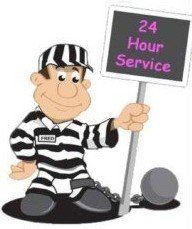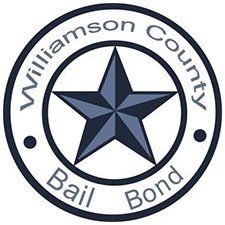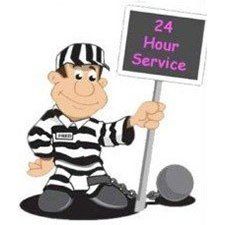Check Out Some FAQs About The Bail Bond Process
Frequently Asked Questions
- How can I find out if I have a Williamson County warrant?
- How can I obtain Williamson County Bail Bond information?
- What are the various roles of Williamson County courtroom personnel?
- What are the different levels of offenses?
- How are the cases filed and processed?
- What happens when I go to court?
- How will the case proceed?
- What are the courtroom Do’s and Don’ts?
Give us a call today to get all your questions answered.
We're located 1 block south of Williamson County Jail. Talk to our live local bond agents today.
Learn more about the bail bond process below:
- Suspect is arrested
- Suspect is booked
into the local jail facility - Booking refers to the process of collecting information about the suspect
being detained. Typically includes taking a photograph with fingerprints, as well as collecting identifying information, such as name, address, and other details that permit the identification of the suspect.
- Process to determine if his/her eligibility for custody release in exchange for the posting of a
bail bond
by an approved surety bail bond company for that county - Magistrate Judge
(within the jail) reviews the suspect’s arrest report and criminal history to determine an appropriate bail amount for the suspect. "Bail" refers to money deposited with the court by a surety bail bond company in order to help ensure that the suspect does not flee the jurisdiction and appears at all future court dates.
- Suspect contacts a surety bail bond company
from the approved companies for that county - A surety bail bond company will charge a fee to post a bond
for a client. The amount of fee is determined by a review of the potential client’s criminal history, bond amount, job status, where they live and who is cosigning for the total bond amount if necessary.
- It usually takes 2-4 hours for the client to be released from the facility after a bond has been posted. After release, the client and cosigner will arrive at our office to complete paperwork, answer questions and discuss our expectations of the client for the duration of the case.
Q.How can I obtain Williamson County Bail Bond information?
A. The fastest and most efficient way to find out if someone is in the Williamson County Jail is to call Williamson County Bail Bond. Our phone line is open 24/7. We'll send one of our licensed bail bonds agents over to the Williamson County Jail to interview your loved one and let them know someone is working on their release. In addition, we'll instruct the person in jail to call our office so we can pass on information to you directly.
Q. What are the various roles of Williamson County courtroom personnel?
A.
- Judge
Each Misdemeanor and Felony Court in Williamson County has an elected judge that presides over the court. In our system, the judge is to be impartial and is to base decisions on the law and evidence that is presented in the courtroom. For this reason, the judge will not speak with a person accused of the crime or with their friends and family. You should never attempt to contact the judge in person, on the phone or in writing. You may speak to the judge if you are in the courtroom with defense counsel present.
- Assistant District Attorney
An Assistant District Attorney in Williamson County is a lawyer employed by the District Attorney. There are two to three Assistant District Attorneys assigned to each court. They conduct jury and bench trials, as well as making plea bargain recommendations. They are required to have no contact with the defendant other than through the defendant’s attorney.
- Court Coordinator / Administrator
This person works for the judge and handles day-to-day business of the court. The coordinator is usually responsible for determining if a person is eligible to receive a court appointed lawyer and is well informed with regard to the policies and procedures of each individual judge. If you have questions regarding court appearances and any other similar matters concerning your case, you may contact this person.
- Court Clerks
The clerks assigned to each court do not work directly for the judge, but rather, work for the county or district clerk’s office. They process all the paperwork that is generated in court and determine a person’s back time (time already spent in jail) and calculate applicable fines and court costs.
- Court Bailiff
This person is an employee of the Williamson County Sheriff’s department. The bailiff is responsible for ensuring the safety of everyone in the court, handling prisoners or those taken into custody in the court. They may also call the docket of the court and inform the judge if a defendant has appeared in court on the proper date and time.
Q. What are the different levels of offenses?
A. At the Williamson County courthouse, offenses are prosecuted at the lowest level of Class B misdemeanors up to the highest level of First Degree felonies. Examples of the level of each type of offense and the possible ranges of punishments are as follows:
- Class B Misdemeanor
Confinement for a term not exceeding 180 days in the county jail; and / or a fine up to $2,000.
Example: DWI (Driving While Intoxicated), criminal trespassing, theft by check between $50 to $500, evading arrest or detention.
- Class A Misdemeanor
Confinement for a term not exceeding one year in the county jail; and / or a fine up to $4,000.
Example: A second DWI, assault, burglary of a vehicle, Unlawfully carrying a weapon.
- State Jail Felony
Confinement for a term from 180 days to two years in a state jail; and / or fine up to $4,000.Example: Credit card abuse, unauthorized use of a motor vehicle, reckless injury to a child.
- Third Degree Felony
Confinement for a term from two to 10 years in prison; and an optional fine not exceeding $10,000.Example: A third DWI, indecency with a child, kidnapping, possession of a firearm by a felon.
- Second Degree Felony
Confinement for a term from two to 20 years in prison; and an optional fine not exceeding $10,000.Example: Aggravated assault or kidnapping (if the victim is released unharmed), arson, robbery, sexual assault.
- First Degree Felony
Life imprisonment or five to 99 years in prison; and an optional fine not exceeding $10,000.Example: Murder, aggravated kidnapping, robbery, or sexual assault.
- Capital Felony
Life imprisonment or the death penalty. If the State does not seek the death penalty upon conviction, an automatic life sentence is imposed. Where the State seeks the death penalty upon conviction, the jury must answer questions which may result in either life imprisonment or the death sentence. Example: Murder during the commission of another felony such as kidnapping, rape or robbery.
Q. How are the cases filed and processed?
A.
- Misdemeanor Offenses
Misdemeanor cases are filed by the police agency with the Williamson County District Attorney’s Office. If the Williamson County District Attorney’s Office decides to prosecute the case, an information document is created. The information is a written statement filed and presented on behalf of the State of Texas by the district attorney, charging the defendant with an offense. It provides the defendant with notice as to the offense for which he stands charged. Once the information has been processed, a file is generated and the case is randomly assigned to a misdemeanor court.
- Felony Offenses
Felony-level offenses are filed by the police agency with the District Attorney Office. The District Attorney’s Office then generates a charging instrument known as indictment. An indictment is the written statement of a grand jury accusing a person therein named of some act or omission which, by law, is declared to be an offense. The indictment puts the defendant on notice regarding the charges being brought. Once the paperwork has been generated the case is then set to be heard by the grand jury. The grand jury is a panel of citizens who briefly review the information provided by the police who then make a determination whether there is sufficient evidence to believe that an offense has occurred. Any person charged with a felony offense has an absolute right to have his or her case indicted by the grand jury. Once filed, a felony case is randomly assigned to a felony court. It may take weeks to months before a case is actually heard by the grand jury. The grand jury will either issue a true bill of indictment or a no bill. True bill means that the grand jury found that there was enough evidence to believe that an offense did occur. The case will then be forwarded to the felony court which it was assigned to. A no bill means that the grand jury did not believe that there was enough evidence with the case that was filed.
Q. What happens when I go to court?
A. If the defendant remains in the Williamson County Jail, he or she will be brought to the court in jail chains (inmates are brought to the courts in a group through secured access). The defendant will not be brought to court on his or her own request, but at the request of the Williamson County court or the attorney. If the defendant is not brought down to court or notified that an attorney has been appointed, then the defendant should request that the Williamson County Sheriff allow written communication with the court.
If the defendant is set for a jury trial (six chosen citizens for misdemeanors and twelve chosen citizens for felonies hear the case and render the verdict), the defendant will be dressed out in the clothes originally worn when arrested. Family or friends may bring additional clothes for the trial (see discussion of proper clothes below).
The clothes should be taken to the Williamson County Jail, and the sheriff will be able to provide them on the day of the trial. At all other times, the defendant is brought to court in jail uniform.
If on bond, the defendant will be notified by mail (at the address the defendant provides when the bond is signed) as to the date, time and particular court to appear in. On the court date, the defendant should go directly to that court and have a seat inside the courtroom at the time indicated on the letter from the court and if represented by an attorney, follow the directions of the attorney. The defendant must be in court on the date and time instructed or the judge will forfeit the bond for failure to appear which will cause a warrant to be issued for arrest.
Q. How will the case proceed?
A. This process begins once the case has been filed by the police and the Williamson County District Attorney’s Office drafts an information.
- Felony Cases
This process begins when the Williamson County Grand Jury issues a true bill of indictment. Once the case has been indicted, the process begins.
- The First Appearance Setting
If on bond, the defendant must appear in court. It will be determined at this setting if the defendant must hire an attorney or qualify for a court-appointed lawyer. If in jail, the person will be brought to the court in the jail chains. If the defendant cannot afford to hire an attorney, a court-appointed attorney will be appointed.
- Announcement (Pre-Trial) Settings
These settings allow both the defense lawyer and the Williamson County Assistant District Attorney an opportunity to discuss the case and determine if the case will be dismissed, plea bargained (a plea bargain is a resolution of the case where both the district attorney and the defendant agree to a certain punishment). If no plea bargain is reached, the case may be set for a jury trial or a trial before the court (a trial before the court is a trial without a jury).Generally, a case may be set and postponed two or three times or more before the defendant must decide whether to set the case for a plea of guilty or trial (plea of not guilty). One additional choice the defendant has is to set the case for a plea of guilty, even though no plea bargain is reached and elect to have either the judge or juries decide the punishment or sentence. A defendant on bond may be required to appear in court every time the case is set on the court’s docket, regardless of the type of setting and regardless of whether the person’s attorney must also appear. If the person is in jail, he or she will automatically be brought to court for all disposition settings (a disposition setting is a plea of guilty, no contest or a trial or formal pre-trial).
- Final Announcement Setting
At this setting, it must be determined and decided by the defendant whether to accept a plea bargain agreement with the Williamson County Assistant District Attorney or to have a trial. In many courts, once a case is set for trial of any kind, any plea bargain offer is considered rejected and may not be offered again.
- Plea Setting
If a defendant chooses not to have a jury or bench trial, then the case is set for a plea. At the plea setting, a person enters a plea of either guilty or nolo contendere to the charges (a plea of nolo contendere means the person is not pleading guilty but chooses not to contest the charges brought against him. It has the same legal effect as pleading guilty to the charge). A defendant who pleads guilty to the charge may accept either the plea bargain offered by the Williamson County District Attorney, or may enter a plea of guilty and request the judge or jury to set the punishment or sentence.
- Trial Setting
Every defendant charged with a criminal offense has an absolute right to plead not guilty to the charge and have a trial by jury or a trial before a judge (bench trial). In either case, the State of Texas, through an Assistant District Attorney, must prove the defendant guilty of the charges beyond a reasonable doubt. In a misdemeanor trial, there are six jurors who hear the evidence presented in the trial. At the felony level, there are twelve jurors. There are three possible phases to each jury trial. They are: voir dire (jury selection phase); guilty or innocence phase (the time during the trial when evidence is presented); and, if the defendant is determined to be guilty, the punishment phase. A jury’s decision with regard to guilt or innocence must be unanimous (this means that all six or twelve people must reach the same conclusion as to the guilt or innocence of the person on trial). If the jury does not reach a unanimous verdict, the judge may declare a mistrial (also known as a 'hung jury') and the case may be retired. A defendant who has been found guilty of an offense may choose whether the jury or the judge will set his or her punishment. In a bench trial, the judge determines the guilt or innocence of the defendant and sets the punishment. In a jury trial, the defendant elects whether to have the judge or the jury set the punishment.
- Probation
Depending on a number of factors, the defendant may be eligible to have a jail sentence probated. This means that they are not sent to jail but are released and supervised by the Department of Community Supervision.
Q. What are the courtroom Do’s and Don’ts?
A.
- Proper Clothes
Any time you are to appear in a Williamson County court, you should dress as though you are going to a job interview. Men should wear pants and a shirt with a collar. A suit, jacket or tie is always appropriate. Women should wear a dress, skirt or pants that are not too tight, too short, or too low-cut. It is never proper to wear shorts, t-shirts, or sandals. Excessive make-up or jewelry should not be worn. In the courtroom itself, it is never proper to wear a hat, read a newspaper, eat or chew gum.
- Children and Court
While it is important for a person charged with an offense to have family members and / or friends present for the trial or sentencing on a case, it is never beneficial to have small children present, especially if there is a possibility that you may be arrested at court or sentenced to jail. The court may actually contact CPS (Child Protective Services) to take children into custody if a parent is going to jail.
Note:
Nothing stated herein should be construed or interpreted to grant rights or remedies not otherwise granted under federal or state law.



